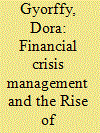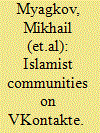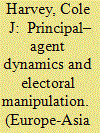| Srl | Item |
| 1 |
ID:
172241


|
|
|
|
|
| Summary/Abstract |
In 2014–2016, the central Ukrainian city of Poltava witnessed the demolition of a Lenin monument and the construction of a monument dedicated to the Ukrainian Cossack hetman Ivan Mazepa. Taking this alteration of the cityscape as a case study, this article examines the change and continuity of political order in post-communist Ukraine in general, and in post-Maidan Ukraine specifically. By investigating the contested meanings of monuments in the city, the article uncovers various ethnonational, religious, political and gender-specific features of Ukrainian society. In so doing, it builds upon the scholarly literature that investigates the symbolic role of monuments in political transformation and draws on a range of data sources including the observation of monuments, policy documents and media coverage.
|
|
|
|
|
|
|
|
|
|
|
|
|
|
|
|
| 2 |
ID:
172240


|
|
|
|
|
| Summary/Abstract |
Within the context of the debates on the worldwide rise of populism, this article aims to uncover factors that may reduce the vulnerability of a system to populist challenges. Based on existing theories, Hungary, Latvia and Romania are all susceptible to populism but authoritarian populism has emerged only in Hungary. This puzzle is addressed through examining the process of financial crisis management in the three cases and its impact on the political system. Comparative analysis shows that paternalistic expectations of the state and the government’s willingness to accept Russian support distinguish Hungary from Latvia and Romania.
|
|
|
|
|
|
|
|
|
|
|
|
|
|
|
|
| 3 |
ID:
172243


|
|
|
|
|
| Summary/Abstract |
This article examines the presence of extremist online communities on the Russian social network VKontakte following the tightening by Russian federal аuthorities of internet counter-extremism policies and censorship. Extremist communities were detected using linguistic markers for extremist attitudes and radical violence. The study of socio-demographic data and network metrics of Islamist extremist communities reveals some general tendencies in the Russian context: a majority of female participants, a highly decentralised community network structure, radical Salafism as the mainstream ideology and covert proselytisation through the discussion of Islamic theology and lifestyle issues that are not in themselves extremist.
|
|
|
|
|
|
|
|
|
|
|
|
|
|
|
|
| 4 |
ID:
172242


|
|
|
|
|
| Summary/Abstract |
Why are some elections manipulated more severely than others, and why do the techniques used to manipulate them vary over time and space? This article addresses these related questions by showing that patronage resources—not incumbent popularity—make manipulation appealing to frontline agents, while local political conditions can make manipulation personally risky for them. Agents can mitigate these risks by adopting more dispersed forms of manipulation like vote-buying, rather than more centralised falsification. These hypotheses are tested using forensic analysis of electoral data from more than 90,000 precincts per election across Russia’s 83 regions, from 2003 to 2012.
|
|
|
|
|
|
|
|
|
|
|
|
|
|
|
|
| 5 |
ID:
172244


|
|
|
|
|
| Summary/Abstract |
China has been committed to resolving its border disputes with Russia since the late 1980s and expedited this move in the wake of the Cold War in the hope of removing what has been referred to as the ‘biggest obstacle’ to the establishment of a strategic partnership with Russia. In so doing, China pursued three interconnected objectives. The first relates to China’s strategic and security environment that, in the Chinese perspective, has worsened since the United States has unilaterally engaged in a policy of China-containment. The second objective is to maintain China’s economic growth through a partnership with its resource-abundant neighbour. Chinese political leadership and academics have considered economic modernisation as their ‘paramount’ task since Deng Xiaoping launched market reform in the late 1970s. The third objective is to fulfil China’s dream of restoring its past glory by rising in the global power hierarchy and reshaping the current world order more to its liking.
|
|
|
|
|
|
|
|
|
|
|
|
|
|
|
|
| 6 |
ID:
172239


|
|
|
|
|
| Summary/Abstract |
This article examines why incumbents facing non-violent demonstrations resign or remain in office. It presents a theoretical framework to analyse five major anti-government protests in Bulgaria (1990–2014) and select protests in Serbia, Romania and Macedonia. Incumbents remain in office if they perceive both the extra-institutional and electoral threats to them as low and unlikely to increase. They resign if either threat is high or increasing. To remove incumbents from power, peaceful protesters must employ an electoral strategy. This article builds on the social movement and colour revolution literatures, while underscoring the relationship between barricades and ballots.
|
|
|
|
|
|
|
|
|
|
|
|
|
|
|
|